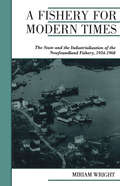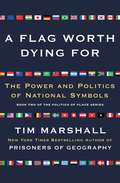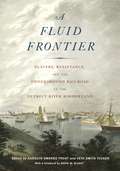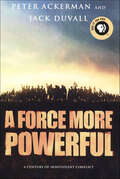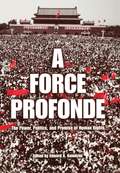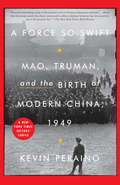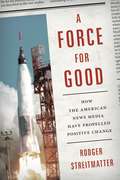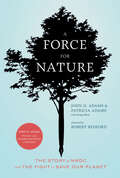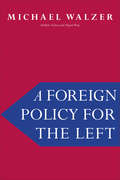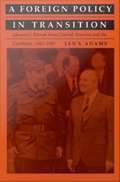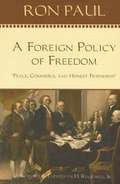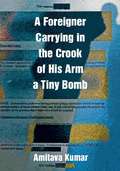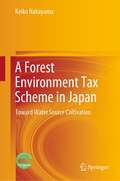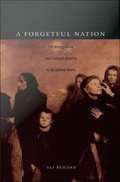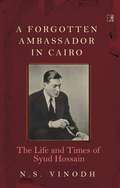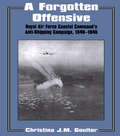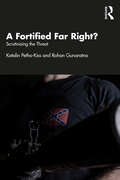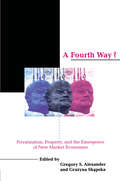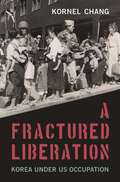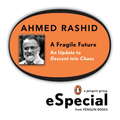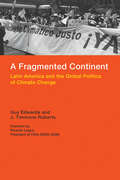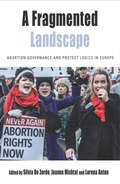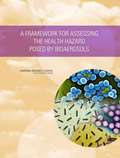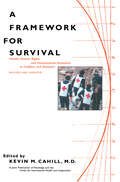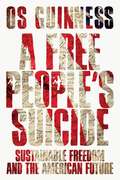- Table View
- List View
A Fishery for Modern Times
by Miriam WrightIn the early 1990s, the northern cod populations off the coast of Newfoundland had become so depleted that the federal government placed a moratorium on commercial fishing. The impact was devastating, both for Newfoundland's economy and for local fishing communities. Today, although this natural resource - exploited commercially for over 500 years - appears to be returning in diminished numbers, many fisheries scientists and fishers question whether the cod will ever return to its former abundance.In A Fishery for Modern Times, Miriam Wright argues that the recent troubles in the fishery can be more fully understood by examining the rise of the industrial fishery in the mid-twentieth century. The introduction of new harvesting technologies and the emergence of 'quick freezing', in the late 1930s, eventually supplanted household production by Newfoundland's fishing families. While the new technologies increased the amount of fish caught in the northwest Atlantic, Wright argues that the state played a critical role in fostering and financing the industrial frozen fish sector. Many bureaucrats and politicians, including Newfoundland's premier, Joseph Smallwood, believed that making the Newfoundland fishery 'modern', with centralization, technology, and expertise, would transform rural society, solving deep-seated economic and social problems.A Fishery for Modern Times examines the ways in which the state, ideologies of development, and political, economic, and social factors, along with political actors and fishing company owners, contributed to the expansion of the industrial fishery from the 1930s through the 1960s. While the promised prosperity never fully materialized, the continuing reliance on approaches favouring high-tech, big capital solutions put increasing pressure on cod populations in the years that followed. As Wright concludes, 'We can no longer afford to view the fisheries resources as "property" of the state and industry, to do with it as they choose. That path had led only to devastation of the resource, economic instability, and great social upheaval.'
A Flag Worth Dying For: The Power and Politics of National Symbols (Politics of Place #2)
by Tim MarshallCombining keen analysis of current events with world history, Tim Marshall, author of the New York Times bestseller Prisoners of Geography, provides &“an entertaining whistle-stop tour of world flags&” (Library Journal)—how their power is used to unite and divide populations and intimidate enemies.For thousands of years flags have represented our hopes and dreams. We wave them. Burn them. March under their colors. And still, in the twenty-first century, we die for them. Flags fly at the UN, on Arab streets, from front porches in Texas. They represent the politics of high power as well as the politics of the mob. From the renewed sense of nationalism in China, to troubled identities in Europe and the USA, to the terrifying rise of Islamic State, the world is a confusing place right now and it&’s important to understand the symbols, old and new, that people are rallying around. In nine chapters (covering the USA, UK, Europe, Middle East, Asia, Africa, Latin America, international flags, and flags of terror), Tim Marshall&’s A Flag Worth Dying For is a &“brisk, entertaining read…that successfully answers a puzzling question: how can a simple piece of cloth come to mean so much? Marshall presents an informative survey of these highly visible symbols of national or international pride&” (Publishers Weekly), representing nation states and non-state actors (including ISIS, Hezbollah, and Hamas), and explains how they figure in diplomatic relations and events today. Drawing on more than twenty-five years of global reporting experience to reveal the true meaning behind the symbols that unite us—and divide us—Marshall &“writes with the cool drollery that characterized the work of Christopher Hitchens or Simon Winchester&” (USA TODAY). The &“illuminating&” (The New York Times) A Flag Worth Dying For is a winning combination of current affairs, politics, and world history and &“a treasure vault for vexillologists, full of meaning beyond the hue and thread of the world&’s banners&” (Kirkus Reviews).
A Fluid Frontier: Slavery, Resistance, and the Underground Railroad in the Detroit River Borderland (Great Lakes Books Series)
by David W. Blight Karolyn Smardz Frost Veta Smith TuckerAs the major gateway into British North America for travelers on the Underground Railroad, the U.S./Canadian border along the Detroit River was a boundary that determined whether thousands of enslaved people of African descent could reach a place of freedom and opportunity. In A Fluid Frontier: Slavery, Resistance, and the Underground Railroad in the Detroit River Borderland, editors Karolyn Smardz Frost and Veta Smith Tucker explore the experiences of the area's freedom-seekers and advocates, both black and white, against the backdrop of the social forces--legal, political, social, religious, and economic--that shaped the meaning of race and management of slavery on both sides of the river. In five parts, contributors trace the beginnings of and necessity for transnational abolitionist activism in this unique borderland, and the legal and political pressures, coupled with African Americans' irrepressible quest for freedom, that led to the growth of the Underground Railroad. A Fluid Frontier details the founding of African Canadian settlements in the Detroit River region in the first decades of the nineteenth century with a focus on the strong and enduring bonds of family, faith, and resistance that formed between communities in Michigan and what is now Ontario. New scholarship offers unique insight into the early history of slavery and resistance in the region and describes individual journeys: the perilous crossing into Canada of sixteen-year-old Caroline Quarlls, who was enslaved by her own aunt and uncle; the escape of the Crosswhite family, who eluded slave catchers in Marshall, Michigan, with the help of others in the town; and the international crisis sparked by the escape of Lucie and Thornton Blackburn and others. With a foreword by David W. Blight, A Fluid Frontier is a truly bi-national collection, with contributors and editors evenly split between specialists in Canadian and American history, representing both community and academic historians. Scholars of the Underground Railroad as well as those in borderland studies will appreciate the interdisciplinary mix and unique contributions of this volume.
A Force More Powerful: A Century of Nonviolent Conflict
by Peter Ackerman Jack DuVallThis nationally-acclaimed book shows how popular movements used nonviolent action to overthrow dictators, obstruct military invaders and secure human rights in country after country, over the past century. Peter Ackerman and Jack DuVall depict how nonviolent sanctions--such as protests, strikes and boycotts--separate brutal regimes from their means of control. They tell inside stories--how Danes outmaneuvered the Nazis, Solidarity defeated Polish communism, and mass action removed a Chilean dictator--and also how nonviolent power is changing the world today, from Burma to Serbia.
A Force Profonde: The Power, Politics, and Promise of Human Rights (Pennsylvania Studies in Human Rights)
by Edward A. KolodziejPresenting detailed portraits by leading authorities of the politics of human rights across the major regions of the globe, A Force Profonde: The Power, Politics, and Promise of Human Rights reveals human rights to be a force as powerful as capitalist markets and technological innovation in shaping global governance. Human rights issues mobilize populations regardless of their national, ethnic, cultural, or religious differences. Yet progress in advancing human rights globally, as Edward A. Kolodziej and the other contributors to the volume contend, depends decisively on the local support and the efforts of the diverse and divided peoples of the world—a prerequisite that remains problematic in many parts of the globe.A Force Profonde explores conceptions of human rights from Western as well as other major world traditions in an attempt to dispel the notion that tyranny, culture, and religion are the only challenges to human rights. Focusing on regional patterns of conflict, the authors point out that violations often have to do with disputes over class, social status, economic privilege, and personal power. In addition, they contend that conflicts over identity are more prevalent in the West than commonly thought. Sharply conflicting views are to be found between the European Union and the United States over issues like the death penalty. Splits within the West between rival Christian sects and between religious adherents and partisans of secularization are no less profound than those in other regions.
A Force So Swift: Mao, Truman, and the Birth of Modern China, 1949
by Kevin PerainoA gripping narrative of the Truman Administration's response to the fall of Nationalist China and the triumph of Mao Zedong's Communist forces in 1949--an extraordinary political revolution that continues to shape East Asian politics to this day. In the opening months of 1949, U.S. President Harry S. Truman found himself faced with a looming diplomatic catastrophe--"perhaps the greatest that this country has ever suffered," as the journalist Walter Lippmann put it. Throughout the spring and summer, Mao Zedong's Communist armies fanned out across mainland China, annihilating the rival troops of America's one-time ally Chiang Kai-shek and taking control of Beijing, Shanghai, and other major cities. As Truman and his aides--including his shrewd, ruthless secretary of state, Dean Acheson--scrambled to formulate a response, they were forced to contend not only with Mao, but also with unrelenting political enemies at home. Over the course of this tumultuous year, Mao would fashion a new revolutionary government in Beijing, laying the foundation for the creation of modern China, while Chiang Kai-shek would flee to the island sanctuary of Taiwan. These events transformed American foreign policy--leading, ultimately, to decades of friction with Communist China, a long-standing U.S. commitment to Taiwan, and the subsequent wars in Korea and Vietnam. Drawing on Chinese and Russian sources, as well as recently declassified CIA documents, Kevin Peraino tells the story of this remarkable year through the eyes of the key players, including Mao Zedong, President Truman, Secretary of State Acheson, Minnesota congressman Walter Judd, and Madame Chiang Kai-shek, the influential first lady of the Republic of China. Today, the legacy of 1949 is more relevant than ever to the relationships between China, the United States, and the rest of the world, as Beijing asserts its claims in the South China Sea and tensions endure between Taiwan and the mainland.
A Force for Good: How the American News Media Have Propelled Positive Change
by Rodger StreitmatterAmerica’s news media are relentlessly criticized as too negative, sensationalistic, profit-oriented, and biased, not to mention unpatriotic and a miserable failure at reflecting the nation’s diversity. The author argues, print and broadcast journalists have propelled significant social topics onto the public agenda and helped build support for change. This text draws on both historical and contemporary examples from a wide range of social contexts; the result is a fascinating tour of American history, social change, and the benefits of a robust media. To simply put, this book is driven by the thesis, that journalism has improved this country in an impressively broad range of areas.
A Force for Nature: The Story of NRDC and the Fight to Save Our Planet
by John H. Adams Patricia Adams Air Vice Marshal George BlackThe pioneering environmental activist recounts his decades-long fight for our planet through the NDRC—with a foreword by Robert Redford.In 1970, John H. Adams was fed up with the levels of pollution in New York City. How could he raise children in a place where layers of soot covered the windows? Working as a lawyer for the U.S. Attorney’s office, he and fellow lawyers teamed up to form Natural Resources Defense Council, a grassroots environmental advocacy group. Over the years, NDRC has grown into an international powerhouse with 1.2 million members and a staff of scientists and lawyers whose mission is to safeguard the planet. This inspiring memoir tells the story of the NRDC and the environmental movement it sparked.
A Foreign Policy for the Left
by Michael WalzerSomething that has been needed for decades: a leftist foreign policy with a clear moral basis Foreign policy, for leftists, used to be relatively simple. They were for the breakdown of capitalism and its replacement with a centrally planned economy. They were for the workers against the moneyed interests and for colonized peoples against imperial (Western) powers. But these easy substitutes for thought are becoming increasingly difficult. Neo-liberal capitalism is triumphant, and the workers’ movement is in radical decline. National liberation movements have produced new oppressions. A reflexive anti-imperialist politics can turn leftists into apologists for morally abhorrent groups. In Michael Walzer’s view, the left can no longer (in fact, could never) take automatic positions but must proceed from clearly articulated moral principles. In this book, adapted from essays published in Dissent, Walzer asks how leftists should think about the international scene—about humanitarian intervention and world government, about global inequality and religious extremism—in light of a coherent set of underlying political values.
A Foreign Policy in Transition: Moscow's Retreat from Central America and the Caribbean 1985-1992
by Jan S. AdamsDuring his years of leadership in the Soviet Union, Mikhail Gorbachev initiated revolutionary changes in that country's foreign and domestic policies. A Foreign Policy in Transition charts the changing Soviet policies toward Central America and the Caribbean during the Gorbachev years, examines the effects of these policies on individual countries, and looks to the role that Russia and the other Soviet-successor states will play in this region in the 1990s. Jan S. Adams analyzes the factors shaping Gorbachev's foreign policy in Central America by surveying Soviet political views old and new, by describing Gorbachev's bold restructuring of the Soviet foreign policy establishment, and by assessing the implications of his policy of perestroika. A series of country studies demonstrates how changes in Soviet policies and domestic and economic circumstances contributed to significant shifts in the internal conditions and external relations of the Central American and Caribbean nations. Adams discusses in detail such topics as the reduction of Soviet military and economic aid to the region and pressures exerted by Moscow on client states to effect the settlement of regional conflicts by political rather than military means. The author concludes by speculating about which trends in foreign policy by Russia and other Soviet-successor states toward Central America and the Caribbean may persist in the post-Soviet period, discussing as the implications of these changes for future U. S. policy in the region.
A Foreign Policy of Freedom, Peace, Commerce, and Honest Friendship
by Ron PaulRon Paul is a true maverick in the House of Representatives. He has consistantly spoken out against our use of troops overseas: Lebanon, Samolia and Iraq, just to name a few. He makes a good case for avoiding foreign conflicts.
A Foreigner Carrying in the Crook of His Arm a Tiny Bomb
by Amitava KumarPart reportage and part protest, A Foreigner Carrying in the Crook of His Arm a Tiny Bomb is an inquiry into the cultural logic and global repercussions of the war on terror. At its center are two men convicted in U.S. courts on terrorism-related charges: Hemant Lakhani, a seventy-year-old tried for attempting to sell a fake missile to an FBI informant, and Shahawar Matin Siraj, baited by the New York Police Department into a conspiracy to bomb a subway. Lakhani and Siraj were caught through questionable sting operations involving paid informants; both men received lengthy jail sentences. Their convictions were celebrated as major victories in the war on terror. In Amitava Kumar's riveting account of their cases, Lakhani and Siraj emerge as epic bunglers, and the U.S. government as the creator of terror suspects to prosecute. Kumar analyzed the trial transcripts and media coverage, and he interviewed Lakhani, Siraj, their families, and their lawyers. Juxtaposing such stories of entrapment in the United States with narratives from India, another site of multiple terror attacks and state crackdowns, Kumar explores the harrowing experiences of ordinary people entangled in the war on terror. He also considers the fierce critiques of post-9/11 surveillance and security regimes by soldiers and torture victims, as well as artists and writers, including Coco Fusco, Paul Shambroom, and Arundhati Roy.
A Forest Environment Tax Scheme in Japan: Toward Water Source Cultivation
by Keiko NakayamaThis book is a work that focuses on the forest environmental tax. Forest resources have played a major role in preventing global warming by absorbing carbon dioxide and supplying oxygen. However, global economic growth has adversely affected the global environment and has exacerbated global warming due to excessive consumption of forest resources. The functions or “services” of forests are diverse, but the interest of the citizenry in forest cultivation is scarce since forests are public goods. Concurrently, Japanese forestry, which has played an important role in forest conservation, is steadily declining, and it is no longer possible for private forest operators to maintain the forest environment. Therefore, in order to realize sustainable economic growth, it is necessary to formulate policies for the conservation of appropriate forest environments. Forest conservation is an especially important policy issue for Japan, where two-thirds of the country is forested. In Japan, a forest environmental tax is being introduced as a forest conservation policy. As of 2021, the forest environmental tax has already been introduced in about two-thirds of the prefectures and soon will be introduced as a national tax. In this book, the significance and issues of the forest environmental tax will be sorted out, and the status of the introduction of the forest environmental tax in Japan will be compared with that of other countries. In addition, there is additional material regarding the water source conservation fund in Toyota City, Aichi Prefecture, a system similar to the forest environmental tax.
A Forgetful Nation: On Immigration and Cultural Identity in the United States
by Ali BehdadIn A Forgetful Nation, the renowned postcolonialism scholar Ali Behdad turns his attention to the United States. Offering a timely critique of immigration and nationalism, Behdad takes on an idea central to American national mythology: that the United States is "a nation of immigrants," welcoming and generous to foreigners. He argues that Americans' treatment of immigrants and foreigners has long fluctuated between hospitality and hostility, and that this deep-seated ambivalence is fundamental to the construction of national identity. Building on the insights of Freud, Nietzsche, Foucault, and Derrida, he develops a theory of the historical amnesia that enables the United States to disavow a past and present built on the exclusion of others. Behdad shows how political, cultural, and legal texts have articulated American anxiety about immigration from the Federalist period to the present day. He reads texts both well-known--J. Hector St. John de Crvecoeur's Letters from an American Farmer, Alexis de Tocqueville's Democracy in America, and Walt Whitman's Leaves of Grass--and lesser-known--such as the writings of nineteenth-century nativists and of public health officials at Ellis Island. In the process, he highlights what is obscured by narratives and texts celebrating the United States as an open-armed haven for everyone: the country's violent beginnings, including its conquest of Native Americans, brutal exploitation of enslaved Africans, and colonialist annexation of French and Mexican territories; a recurring and fierce strand of nativism; the need for a docile labor force; and the harsh discipline meted out to immigrant "aliens" today, particularly along the Mexican border.
A Forgotten Ambassador in Cairo: The Life and Times of Syud Hossain
by Mr. N.S. VinodhAmongst the multitude of tombs in the City of the Dead in Cairo, there lies buried a lone Indian — a scholar, writer, debonair statesman and a leader of the freedom movement. Who is he? How did he get there? For a man who used both the lectern and the pen to devastating effect during the Indian Independence movement led by the likes of Gandhi and Nehru, little is known of Syud Hossain. Born to an aristocratic family in Calcutta, he forayed into journalism early in life and became the editor of Motilal Nehru&’s nationalist newspaper, The Independent. After a brief elopement with Motilal&’s daughter, Sarup (aka Vijaya Lakshmi Pandit), Hossain, under immense pressure from Nehru and Gandhi, annulled the marriage and stayed away from the country. Thus began several years of exile. Eventually, he landed in the United States. Flitting from one place to another, making homes of hotel rooms, he imparted Gandhi&’s message across the country. He fought for India&’s cause from afar, garnering support in the United States and decrying British oppression. Syud Hossain inspired and irked in equal measure; with every speech he delivered and every editorial he penned, he sent a shiver down the spine of the colonial ruler. In addition, Hossain took on the fight for Indian immigrant rights in the United States, one that successfully culminated in President Truman signing the Luce-Celler Bill into an Act in 1946. Hossain returned to India to witness the triumph of her independence as well as the tragedy of Gandhi&’s assassination. Thereafter appointed India&’s first ambassador to Egypt, he died while in service and was laid to rest in Cairo.A Forgotten Ambassador in Cairo offers an illuminating narrative of Hossain&’s life interspersed with historical details that landscapes a vivid political picture of that era. Through primary sources that include Hossain&’s private papers, British Intelligence files, and contemporary correspondence and newspapers, N.S. Vinodh brilliantly brings to life a man who has been relegated far too long to the shadows of time.
A Forgotten Offensive: Royal Air Force Coastal Command's Anti-Shipping Campaign 1940-1945 (Studies in Air Power #No. 1)
by Christina J.M. GoulterThe "forgotten offensive" of the title is RAF Coastal Command's offensive against German sea-trade between 1940 and 1945. The fortunes of the campaign are followed throughout the war, and its success is then evaluated in terms of the shipping sunk, and the impact on the German economy.
A Fortified Far Right?: Scrutinizing the Threat
by Rohan Gunaratna Katalin Petho-KissPetho-Kiss and Gunaratna understand the nature of the threat posed by the far right because of their findings and they propose effective provisions and mechanisms for detecting and countering it.The book undertakes a consistent procession and empirical examination of available information to arrive at the recognition that in order to dissolve the complexity of the associated threat, we need to scrutinize the functioning of far-right threat groups. In-depth and consistent analysis on their mode of operation and mindset enables us to identify ways to detect and counter their malicious efforts and activities. The theoretical framework for the analysis lies upon the concept of wave theory. The main question that this book examines is whether far-right terrorism constitutes a new wave of global terrorism. One question emerges from this statement that requires further elaboration. Is far-right terrorism a novel wave of terrorism? If yes, how is it novel and what are the novelties or developments in it?This book is for scholars as well as practitioners in the counter-terrorism (CT) and the prevention/countering violent extremism (PCVE) field. Through specific case studies students studying CT and/or PCVE could gain insight into the operational functionalities of far-right threat groups. This may help them to get a more accurate understanding of the threat posed by these entities. Examining the recruitment, funding, communication practices, and modus operandi of worrisome threat actors equips us to design the most effective countermeasures and identify the hiatuses in applicable legislative regimes.
A Fourth Way?: Privatization, Property, and the Emergence of New Market Economies
by Gregory S. Alexander Grażyna Ska̧pskaFirst Published in 1994. Routledge is an imprint of Taylor & Francis, an informa company.
A Fractured Liberation: Korea under US Occupation
by Kornel ChangA poignant return to Korea’s forgotten “Asian Spring”—a moment ripe with possibility denied by the postwar US military occupation.When Japanese imperial rule ended in August 1945, the Korean peninsula erupted with hopes that had been bottled up for forty years. New mother Chŏn Sukhŭi marveled at the news, envisioning her son growing up free in an independent Korea. Yi Ilchae, who only days before had been drafted into the Japanese army, threw himself into union activism. An electrifying excitement jolted Koreans into action everywhere. Peasants occupied Japanese-owned farmlands, workers seized control of factories, and women demanded political and economic equality.A Fractured Liberation brings to vivid life the brief but intense moment in postwar Korea when anything seemed possible, but nothing was guaranteed. The country had been abruptly split into US and Soviet military occupation zones, but, as Kornel Chang shows, ordinary people threw themselves into achieving self-governance throughout a unified Korea. The mostly left-leaning efforts were bolstered by an eclectic group of American supporters, including New Deal liberals, Christian socialists, and trade unionists.The Koreans’ greatest obstacle, however, proved to be the US military government in the south and its rigidly anti-communist leadership. Despite promising liberation from the hated Japanese-imposed institutions, the US occupation government under General John R. Hodge hired back Koreans who had worked for the Japanese to do the dirty work of curbing protests and muzzling reformers. As concern over the budding superpower rivalry with the Soviet Union overshadowed the Koreans’ democratic aspirations, the United States increasingly narrowed the possibilities for Korean independence, helping to cement the North-South divide and ensure decades of authoritarian rule on both sides.
A Fragile Future
by Ahmed RashidDescent into Chaos is Ahmed Rashid's sweeping, brilliant exploration of the failure of the United States to secure peace and nourish democracy in Pakistan and Afghanistan after the removal of the Taliban following 9/11. Thoroughly researched and powerfully written, it has been hailed from all corners as one of the most important books on the effects of American policy in the Middle East to appear in some time.In this searching update, Rashid takes stock of events in Pakistan since the book's publication, including the 2008 elections, the end of the Musharraf era, and the further resurgence of the Taliban. Up from Chaos makes the convincing case that if peace is to come to central Asia, Pakistan remains the key.
A Fragmented Continent: Latin America and the Global Politics of Climate Change (Politics, Science, and the Environment)
by J. Timmons Roberts Guy EdwardsHow Latin American countries became leading voices and innovators on addressing climate change—and what threatens their leadership.Latin American countries have increased their influence at the United Nations climate change negotiations and offered potential solutions on coping with global warming. But in the face of competing priorities, sometimes these climate policies are jettisoned, undermined, or simply ignored. A Fragmented Continent focuses on Latin America's three major blocs at the U.N. climate negotiations and how they attempt to balance climate action with building prosperity. Brazil has reduced its deforestation but continues its drive for economic growth and global recognition. A leftist group led by Venezuela, Bolivia, and Ecuador decries the injustice of climate change but is highly dependent on the export of fossil fuels. A new group, including Chile, Costa Rica, and Peru and supported by Mexico, offers sharp reductions in their carbon emissions in return for greater action by others; these countries now have to deliver on their promises. Weaving together issues of politics and economy, trade, foreign policy, civil society, and environmental protection, A Fragmented Continent offers a long-missing perspective on one of this century's greatest challenges and neglected regions.
A Fragmented Landscape: Abortion Governance and Protest Logics in Europe (Protest, Culture & Society #20)
by Silvia De Zordo Joanna Mishtal Lorena AntonSince World War II, abortion policies have remained remarkably varied across European nations, with struggles over abortion rights at the forefront of national politics. This volume analyses European abortion governance and explores how social movements, political groups, and individuals use protests and resistance to influence abortion policy. Drawing on case studies from Italy, Spain, Norway, Poland, Romania, Russia, Sweden, Switzerland, the United Kingdom and the European Union, it analyses the strategies and discourses of groups seeking to liberalise or restrict reproductive rights. It also illuminates the ways that reproductive rights politics intersect with demographic anxieties, as well as the rising nationalisms and xenophobia related to austerity policies, mass migration and the recent terrorist attacks in Europe.�
A Framework for Assessing the Health Hazard Posed by Bioaerosols
by National Research Council of the National AcademiesBiological warfare agent (BWA) detectors are designed to provide alerts to military personnel of the presence of dangerous biological agents. Detecting such agents promptly makes it possible to minimize contamination and personnel exposure and initiate early treatment. It is also important, though, that detectors not raise an alarm when the situation does not warrant it. The question considered in this book is whether Agent-Containing Particles per Liter of Air (ACPLA) is an appropriate unit of measure for use in the evaluation of aerosol detectors and whether a better, alternative measure can be developed. The book finds that ACPLA alone cannot determine whether a health threat exists. In order to be useful and comparable across all biological agents and detection systems, measurements must ultimately be related to health hazard. A Framework for Assessing the Health Hazard Posed by Bioaerosols outlines the possibility of a more complex, but more useful measurement framework that makes it possible to evaluate relative hazard by including agent identity and activity, particle size, and infectious dose.
A Framework for Survival: Health, Human Rights, and Humanitarian Assistance in Conflicts and Disasters
by Kevin M. CahillFirst Published in 2000. Routledge is an imprint of Taylor & Francis, an informa company.
A Free People's Suicide: Sustainable Freedom and the American Future
by Os Guinness"If destruction be our lot, we must ourselves be its author and finisher. As a nation of freemen, we must live through all time, or die by suicide." Abraham Lincoln Nothing is more daring in the American experiment than the founders' belief that the American republic could remain free forever. But how was this to be done, and are Americans doing it today? It is not enough for freedom to be won. It must also be sustained. Cultural observer Os Guinness argues that the American experiment in freedom is at risk. Summoning historical evidence on how democracies evolve, Guinness shows that contemporary views of freedom--most typically, a negative freedom from constraint-- are unsustainable because they undermine the conditions necessary for freedom to thrive. He calls us to reconsider the audacity of sustainable freedom and what it would take to restore it. "In the end," Guinness writes, "the ultimate threat to the American republic will be Americans. The problem is not wolves at the door but termites in the floor." The future of the republic depends on whether Americans will rise to the challenge of living up to America's unfulfilled potential for freedom, both for itself and for the world.
